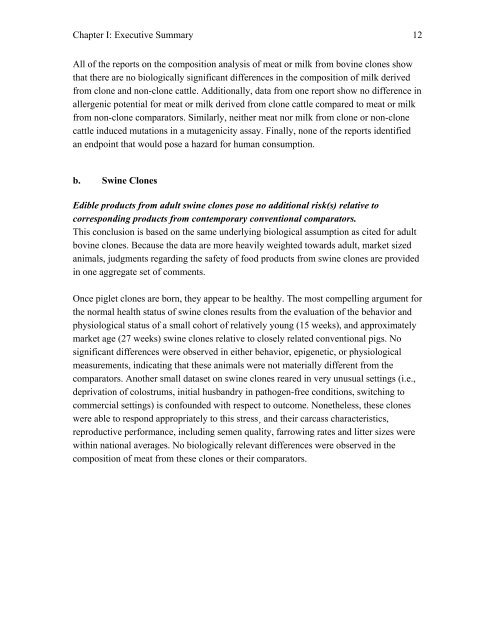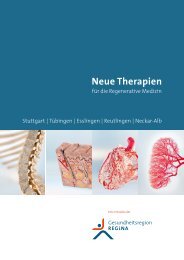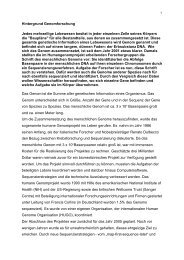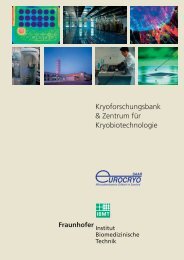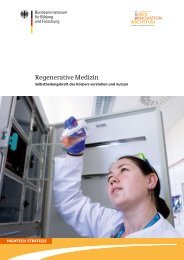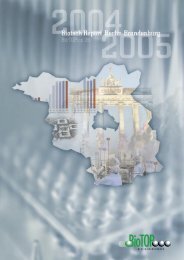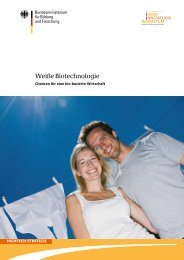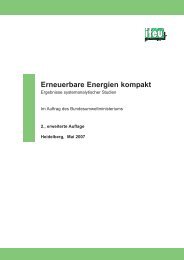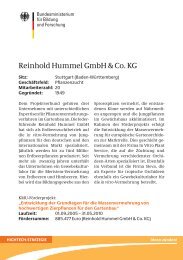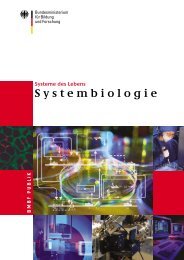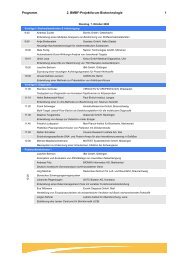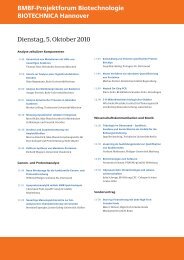- Page 1: Animal Cloning: A Draft Risk Assess
- Page 4 and 5: Chapter III: Developing the Risk As
- Page 6 and 7: i. Peer-reviewed literature........
- Page 8 and 9: iii. Reproductive Development and F
- Page 10 and 11: 2. Evaluations Performed...........
- Page 13 and 14: This page intentionally left blank.
- Page 15 and 16: Preface
- Page 17 and 18: Preface The following Draft Risk As
- Page 19 and 20: Chapter I: Executive Summary
- Page 21 and 22: Chapter I: Executive Summary Clonin
- Page 23 and 24: Chapter I: Executive Summary 5 of A
- Page 25 and 26: Chapter I: Executive Summary 7 haza
- Page 27 and 28: Chapter I: Executive Summary 9 appe
- Page 29: Chapter I: Executive Summary 11 Edi
- Page 33 and 34: Chapter I: Executive Summary 15 or
- Page 35 and 36: Chapter II: Technology Overview Som
- Page 37 and 38: Chapter II: Technology Overview: So
- Page 39 and 40: Chapter II: Technology Overview 21
- Page 41 and 42: Chapter II: Technology Overview 23
- Page 43 and 44: Chapter II: Technology Overview 25
- Page 45 and 46: Chapter II: Technology Overview 27
- Page 47 and 48: Chapter II: Technology Overview 29
- Page 49 and 50: Chapter II: Technology Overview 31
- Page 51 and 52: Chapter II: Technology Overview 33
- Page 53 and 54: Chapter II: Technology Overview 35
- Page 55 and 56: Chapter II: Technology Overview 37
- Page 57 and 58: Chapter III: Developing the Risk As
- Page 59 and 60: A. Charge Chapter III: Developing t
- Page 61 and 62: Chapter III: Developing the Risk As
- Page 63 and 64: Chapter III: Developing the Risk As
- Page 65 and 66: Chapter III: Developing the Risk As
- Page 67 and 68: Chapter III: Developing the Risk As
- Page 69 and 70: Chapter III: Developing the Risk As
- Page 71 and 72: Chapter III: Developing the Risk As
- Page 73 and 74: Chapter III: Developing the Risk As
- Page 75 and 76: Chapter IV: The Implications of Epi
- Page 77 and 78: Chapter IV: Epigenetic Reprogrammin
- Page 79 and 80: Chapter IV: Epigenetic Reprogrammin
- Page 81 and 82:
Chapter IV: Epigenetic Reprogrammin
- Page 83 and 84:
Chapter IV: Epigenetic Reprogrammin
- Page 85 and 86:
Chapter IV: Epigenetic Reprogrammin
- Page 87 and 88:
Chapter IV: Epigenetic Reprogrammin
- Page 89 and 90:
Chapter IV: Epigenetic Reprogrammin
- Page 91 and 92:
Chapter IV: Epigenetic Reprogrammin
- Page 93 and 94:
Chapter IV: Epigenetic Reprogrammin
- Page 95 and 96:
Chapter IV: Epigenetic Reprogrammin
- Page 97 and 98:
Chapter IV: Epigenetic Reprogrammin
- Page 99 and 100:
Chapter IV: Epigenetic Reprogrammin
- Page 101 and 102:
Chapter IV: Epigenetic Reprogrammin
- Page 103 and 104:
Chapter IV: Epigenetic Reprogrammin
- Page 105 and 106:
Chapter IV: Epigenetic Reprogrammin
- Page 107 and 108:
Chapter IV: Epigenetic Reprogrammin
- Page 109 and 110:
Chapter V: Animal Health Risks
- Page 111 and 112:
Chapter V: Animal Health Risks A. P
- Page 113 and 114:
Chapter V: Animal Health Risks 95 f
- Page 115 and 116:
Chapter V: Animal Health Risks 97 n
- Page 117 and 118:
Chapter V: Animal Health Risks 99 o
- Page 119 and 120:
Chapter V: Animal Health Risks 101
- Page 121 and 122:
Chapter V: Animal Health Risks 103
- Page 123 and 124:
Chapter V: Animal Health Risks 105
- Page 125 and 126:
Chapter V: Animal Health Risks 107
- Page 127 and 128:
Chapter V: Animal Health Risks 109
- Page 129 and 130:
Chapter V: Animal Health Risks 111
- Page 131 and 132:
Chapter V: Animal Health Risks 113
- Page 133 and 134:
Chapter V: Animal Health Risks 115
- Page 135 and 136:
Chapter V: Animal Health Risks 117
- Page 137 and 138:
Chapter V: Animal Health Risks 119
- Page 139 and 140:
Chapter V: Animal Health Risks 121
- Page 141 and 142:
Chapter V: Animal Health Risks 123
- Page 143 and 144:
Chapter V: Animal Health Risks 125
- Page 145 and 146:
Chapter V: Animal Health Risks 127
- Page 147 and 148:
Chapter V: Animal Health Risks 129
- Page 149 and 150:
Chapter V: Animal Health Risks 131
- Page 151 and 152:
Chapter V: Animal Health Risks 133
- Page 153 and 154:
Chapter V: Animal Health Risks 135
- Page 155 and 156:
Chapter V: Animal Health Risks 137
- Page 157 and 158:
Chapter V: Animal Health Risks 139
- Page 159 and 160:
Chapter V: Animal Health Risks 141
- Page 161 and 162:
Chapter V: Animal Health Risks 143
- Page 163 and 164:
Chapter V: Animal Health Risks 145
- Page 165 and 166:
Chapter V: Animal Health Risks 147
- Page 167 and 168:
Chapter V: Animal Health Risks 149
- Page 169 and 170:
Chapter V: Animal Health Risks 151
- Page 171 and 172:
Chapter V: Animal Health Risks 153
- Page 173 and 174:
Chapter V: Animal Health Risks 155
- Page 175 and 176:
Chapter V: Animal Health Risks 157
- Page 177 and 178:
Chapter V: Animal Health Risks 159
- Page 179 and 180:
Chapter V: Animal Health Risks 161
- Page 181 and 182:
Chapter V: Animal Health Risks 163
- Page 183 and 184:
Chapter V: Animal Health Risks 165
- Page 185 and 186:
Chapter V: Animal Health Risks 167
- Page 187 and 188:
Chapter V: Animal Health Risks 169
- Page 189 and 190:
Chapter V: Animal Health Risks 171
- Page 191 and 192:
Chapter V: Animal Health Risks 173
- Page 193 and 194:
Chapter V: Animal Health Risks 175
- Page 195 and 196:
Chapter VI: Food Consumption Risks
- Page 197 and 198:
Chapter VI: Food Consumption Risks
- Page 199 and 200:
Chapter VI: Food Consumption Risks
- Page 201 and 202:
Chapter VI: Food Consumption Risks
- Page 203 and 204:
Chapter VI: Food Consumption Risks
- Page 205 and 206:
Chapter VI: Food Consumption Risks
- Page 207 and 208:
Chapter VI: Food Consumption Risks
- Page 209 and 210:
Chapter VI: Food Consumption Risks
- Page 211 and 212:
Chapter VI: Food Consumption Risks
- Page 213 and 214:
Chapter VI: Food Consumption Risks
- Page 215 and 216:
Chapter VI: Food Consumption Risks
- Page 217 and 218:
Chapter VI: Food Consumption Risks
- Page 219 and 220:
Chapter VI: Food Consumption Risks
- Page 221 and 222:
Chapter VI: Food Consumption Risks
- Page 223 and 224:
Chapter VI: Food Consumption Risks
- Page 225 and 226:
Chapter VI: Food Consumption Risks
- Page 227 and 228:
Chapter VI: Food Consumption Risks
- Page 229 and 230:
Chapter VI: Food Consumption Risks
- Page 231 and 232:
Chapter VI: Food Consumption Risks
- Page 233 and 234:
Chapter VI: Food Consumption Risks
- Page 235 and 236:
Chapter VI: Food Consumption Risks
- Page 237 and 238:
Chapter VI: Food Consumption Risks
- Page 239 and 240:
Chapter VI: Food Consumption Risks
- Page 241 and 242:
Chapter VI: Food Consumption Risks
- Page 243 and 244:
Chapter VI: Food Consumption Risks
- Page 245 and 246:
Chapter VI: Food Consumption Risks
- Page 247 and 248:
Chapter VI: Food Consumption Risks
- Page 249 and 250:
Chapter VI: Food Consumption Risks
- Page 251 and 252:
Chapter VI: Food Consumption Risks
- Page 253 and 254:
Chapter VI: Food Consumption Risks
- Page 255 and 256:
Chapter VI: Food Consumption Risks
- Page 257 and 258:
Chapter VI: Food Consumption Risks
- Page 259 and 260:
Chapter VI: Food Consumption Risks
- Page 261 and 262:
Chapter VI: Food Consumption Risks
- Page 263 and 264:
Chapter VI: Food Consumption Risks
- Page 265 and 266:
Chapter VI: Food Consumption Risks
- Page 267 and 268:
Chapter VI: Food Consumption Risks
- Page 269 and 270:
Chapter VI: Food Consumption Risks
- Page 271 and 272:
Chapter VI: Food Consumption Risks
- Page 273 and 274:
Chapter VI: Food Consumption Risks
- Page 275 and 276:
Chapter VI: Food Consumption Risks
- Page 277 and 278:
Chapter VI: Food Consumption Risks
- Page 279 and 280:
Chapter VI: Food Consumption Risks
- Page 281 and 282:
Chapter VI: Food Consumption Risks
- Page 283 and 284:
Chapter VI: Food Consumption Risks
- Page 285 and 286:
Chapter VI: Food Consumption Risks
- Page 287 and 288:
Chapter VI: Food Consumption Risks
- Page 289 and 290:
Chapter VI: Food Consumption Risks
- Page 291 and 292:
Chapter VI: Food Consumption Risks
- Page 293 and 294:
Chapter VI: Food Consumption Risks
- Page 295 and 296:
Chapter VI: Food Consumption Risks
- Page 297 and 298:
Chapter VI: Food Consumption Risks
- Page 299 and 300:
Chapter VI: Food Consumption Risks
- Page 301 and 302:
Chapter VI: Food Consumption Risks
- Page 303 and 304:
Chapter VI: Food Consumption Risks
- Page 305 and 306:
Chapter VI: Food Consumption Risks
- Page 307 and 308:
Chapter VI: Food Consumption Risks
- Page 309 and 310:
Chapter VI: Food Consumption Risks
- Page 311 and 312:
Chapter VI: Food Consumption Risks
- Page 313 and 314:
Chapter VI: Food Consumption Risks
- Page 315 and 316:
Chapter VI: Food Consumption Risks
- Page 317 and 318:
Chapter VI: Food Consumption Risks
- Page 319 and 320:
Chapter VI: Food Consumption Risks
- Page 321 and 322:
Chapter VII: Summary and Conclusion
- Page 323 and 324:
Chapter VII Summary and Conclusions
- Page 325 and 326:
Chapter VII: Summary and Conclusion
- Page 327 and 328:
Chapter VII: Summary and Conclusion
- Page 329 and 330:
Glossary The following terms are de
- Page 331 and 332:
Glossary 313 chromosome(s) A struct
- Page 333 and 334:
Glossary 315 ectoderm The outermost
- Page 335 and 336:
Glossary 317 reprogramming cell’s
- Page 337 and 338:
Glossary 319 ketonuria Ketone bodie
- Page 339 and 340:
Glossary 321 nucleus The most consp
- Page 341 and 342:
Glossary 323 promoter A segment of
- Page 343 and 344:
Glossary 325 translation The second
- Page 345 and 346:
References Agca Y, Monson RL, North
- Page 347 and 348:
References 329 Bishop MD (2000) Clo
- Page 349 and 350:
References 331 CHANG MC (1959) Fert
- Page 351 and 352:
References 333 alpha(1,3)galactosyl
- Page 353 and 354:
References 335 Farin PW, Farin CE (
- Page 355 and 356:
References 337 Hajkova P, Erhardt S
- Page 357 and 358:
References 339 Ideta A, Urakawa M,
- Page 359 and 360:
References 341 King KK, Seidel GE,
- Page 361 and 362:
References 343 Li E (2002) Chromati
- Page 363 and 364:
References 345 National Academy of
- Page 365 and 366:
References 347 Pearson, H. Adult cl
- Page 367 and 368:
References 349 Reimers TJ, Lamb SV,
- Page 369 and 370:
References 351 Sebastiano V, Gentil
- Page 371 and 372:
References 353 Tamashiro KL, Wakaya
- Page 373 and 374:
References 355 Vonnahme KA, Wilson
- Page 375 and 376:
References 357 Wilmut I, Young L, D
- Page 377 and 378:
Appendix A: Risk and Safety Assessm
- Page 379 and 380:
Appendix A: Risk and Safety Assessm
- Page 381 and 382:
Appendix A: Risk and Safety Assessm
- Page 383 and 384:
Appendix B: Overall Reproductive Ef
- Page 385 and 386:
Appendix B :Overall Reproductive Ef
- Page 387 and 388:
Appendix B: Overall Reproductive Ef
- Page 389 and 390:
Appendix B: Overall Reproductive Ef
- Page 391 and 392:
Appendix B: Overall Reproductive Ef
- Page 393 and 394:
Appendix B: Overall Reproductive Ef
- Page 395 and 396:
Appendix C: Comparison of Outcomes
- Page 397 and 398:
Appendix C: Comparisons of Outcomes
- Page 399 and 400:
Appendix C: Comparisons of Outcomes
- Page 401 and 402:
Appendix C: Comparisons of Outcomes
- Page 403 and 404:
Appendix C: Comparisons of Outcomes
- Page 405 and 406:
Appendix C: Comparisons of Outcomes
- Page 407 and 408:
Appendix C: Comparisons of Outcomes
- Page 409 and 410:
Appendix D: Transgenic Clones Anima
- Page 411 and 412:
A. Issues Appendix D Transgenic Clo
- Page 413 and 414:
Appendix D: Transgenic Clones D-5 o
- Page 415 and 416:
Appendix D: Transgenic Clones D-7 a
- Page 417 and 418:
Appendix D: Transgenic Clones D-9 w
- Page 419 and 420:
Appendix D: Transgenic Clones D-11
- Page 421 and 422:
Appendix D: Transgenic Clones D-13
- Page 423 and 424:
Appendix E: The Cyagra Dataset Anim
- Page 425 and 426:
Appendix E: The Cyagra Dataset A. R
- Page 427 and 428:
Appendix E: The Cyagra Dataset E-5
- Page 429 and 430:
Appendix E: The Cyagra Dataset E-7
- Page 431 and 432:
Appendix E: The Cyagra Dataset E-9
- Page 433 and 434:
Appendix E: The Cyagra Dataset E-11
- Page 435 and 436:
Appendix E: The Cyagra Dataset E-13
- Page 437 and 438:
Appendix E: The Cyagra Dataset E-15
- Page 439 and 440:
Appendix E: The Cyagra Dataset E-17
- Page 441 and 442:
Appendix E: The Cyagra Dataset E-19
- Page 443 and 444:
Appendix E: The Cyagra Dataset E-21
- Page 445 and 446:
Appendix E: The Cyagra Dataset E-23
- Page 447 and 448:
Appendix E: The Cyagra Dataset E-25
- Page 449 and 450:
Appendix E: The Cyagra Dataset E-27
- Page 451 and 452:
Appendix E: The Cyagra Dataset E-29
- Page 453 and 454:
Appendix E: The Cyagra Dataset E-31
- Page 455 and 456:
Appendix E: The Cyagra Dataset E-33
- Page 457 and 458:
Cyagra Inc. Table E-5: Cloned Birth
- Page 459 and 460:
Cyagra Inc. Table E-5: Cloned Birth
- Page 461 and 462:
Table E-100a: Individual Animal Cli
- Page 463 and 464:
Table E-100b: Individual Animal Hem
- Page 465 and 466:
Table E-200a: Individual Animal Cli
- Page 467 and 468:
Table E-200b: Individual Animal Cli
- Page 469 and 470:
Table E-300a: Individual Animal Cli
- Page 471 and 472:
Table E-300b: Individual Animal Hem
- Page 473 and 474:
Appendix F: The Viagen Dataset Anim
- Page 475 and 476:
A. Background Appendix F: The Viage
- Page 477 and 478:
Appendix F: The Viagen Dataset F-5
- Page 479 and 480:
Appendix F: The Viagen Dataset F-7
- Page 481 and 482:
Appendix F: The Viagen Dataset F-9
- Page 483 and 484:
Appendix F: The Viagen Dataset F-11
- Page 485 and 486:
Appendix F: The Viagen Dataset F-13
- Page 487 and 488:
Appendix F: The Viagen Dataset F-15
- Page 489 and 490:
Appendix F: The Viagen Dataset F-17
- Page 491 and 492:
Appendix F: The Viagen Dataset F-19
- Page 493 and 494:
Appendix F: The Viagen Dataset F-21
- Page 495 and 496:
Appendix F: The Viagen Dataset F-23
- Page 497 and 498:
Appendix F: The Viagen Dataset F-25
- Page 499 and 500:
Appendix F: The Viagen Dataset F-27
- Page 501 and 502:
Appendix F: The Viagen Dataset F-29
- Page 503 and 504:
Appendix F: The Viagen Dataset F-31
- Page 505 and 506:
Appendix F: The Viagen Dataset F-33
- Page 507 and 508:
Appendix F: The Viagen Dataset F-35
- Page 509 and 510:
Appendix F: The Viagen Dataset F-37
- Page 511 and 512:
Appendix F: The Viagen Dataset F-39
- Page 513 and 514:
Appendix F: The Viagen Dataset F-41
- Page 515 and 516:
Appendix F: The Viagen Dataset F-43
- Page 517 and 518:
Appendix F: The Viagen Dataset F-45
- Page 519 and 520:
Appendix F: The Viagen Dataset F-47
- Page 521 and 522:
Appendix F: The Viagen Dataset F-49
- Page 523 and 524:
Appendix F: The Viagen Dataset F-51
- Page 525 and 526:
Chart F-1 (Page 1): Summary of Clin
- Page 527 and 528:
Chart F-1 (Page 3): Summary of Clin
- Page 529 and 530:
Chart F-1 (Page 5): Summary of Clin
- Page 531 and 532:
Chart F-1 (Page 7): Summary of Clin
- Page 533 and 534:
Chart F-1 (Page 9): Summary of Clin
- Page 535 and 536:
Chart F-1 (Page 11): Summary of Cli
- Page 537 and 538:
Chart F-2 (Page 1): Summary of Hema
- Page 539 and 540:
Chart F-2 (Page 3): Summary of Hema
- Page 541 and 542:
Chart F-2 (Page 5): Summary of Hema
- Page 543 and 544:
Chart F-2 (Page 7): Summary of Hema
- Page 545 and 546:
Chart F-3 (Page 1): Summary of Clin
- Page 547 and 548:
Chart F-3 (Page 3): Summary of Clin
- Page 549 and 550:
Chart F-3 (Page 5): Summary of Clin
- Page 551 and 552:
Chart F-3 (Page 7): Summary of Clin
- Page 553 and 554:
Chart F-3 (Page 9): Summary of Clin
- Page 555 and 556:
Chart F-3 (Page 11): Summary of Cli
- Page 557 and 558:
Chart F-4 (Page 1): Summary of Hema
- Page 559 and 560:
Chart F-4 (Page 3): Summary of Hema
- Page 561 and 562:
Chart F-4 (Page 5): Summary of Hema
- Page 563 and 564:
Chart F-4 (Page 7): Summary of Hema
- Page 565 and 566:
Chart F-5 (Page 1): Summary of Clin
- Page 567 and 568:
Chart F-5 (Page 3): Summary of Clin
- Page 569 and 570:
Chart F-5 (Page 5): Summary of Clin
- Page 571 and 572:
Chart F-5 (Page 7): Summary of Clin
- Page 573 and 574:
Chart F-5 (Page 9): Summary of Clin
- Page 575 and 576:
Chart F-5 (Page 11): Summary of Cli
- Page 577 and 578:
Chart F-6 (Page 1): Summary of Hema
- Page 579 and 580:
Chart F-6 (Page 3): Summary of Hema
- Page 581 and 582:
Chart F-6 (Page 5): Summary of Hema
- Page 583 and 584:
Chart F-6 (Page 7): Summary of Hema
- Page 585 and 586:
Chart F-7 (Page 1): Summary of Urin
- Page 587 and 588:
Chart F-7 (Page 3): Summary of Urin
- Page 589 and 590:
Chart F-7 (Page 5): Summary of Urin
- Page 591 and 592:
Chart F-7 (Page 7): Summary of Urin
- Page 593 and 594:
Chart F-7 (Page 9): Summary of Urin
- Page 595 and 596:
Chart F-7 (Page 11): Summary of Uri
- Page 597 and 598:
This page intentionally left blank.
- Page 599 and 600:
Appendix G Investigation on the Att
- Page 601 and 602:
Appendix G Investigation on the Att
- Page 603 and 604:
Appendix G: The Comprehensive Veter
- Page 605 and 606:
A project aided by the Agriculture
- Page 607 and 608:
- Contents - Results of an investig
- Page 609 and 610:
Appendix G: The Comprehensive Veter
- Page 611 and 612:
Press Release 1 August 13, 2002 Liv
- Page 613 and 614:
(Material and method) The general c
- Page 615 and 616:
Table 1. General components (1) Mil
- Page 617 and 618:
Table 5. Feed study of milk and mea
- Page 619 and 620:
Appendix G: The Comprehensive Veter
- Page 621 and 622:
Table 1 Analyzed nutrient compositi
- Page 623 and 624:
Table 3 Body weights of male rats f
- Page 625 and 626:
Table 7 Urinary findings of male ra
- Page 627 and 628:
Table 11 Blood biochemical 6ndings
- Page 629 and 630:
TaUe 14 Absduw and rehtiw arm weigh
- Page 631 and 632:
Appendix 3 Individual food consumpt
- Page 633 and 634:
Appendix 7 Individual hematological
- Page 635 and 636:
Appendix 9 - 1 Individual blood bio
- Page 637 and 638:
Appsndix 11 Ahrdute -weights of ind
- Page 639 and 640:
Table 1 Analyzed nutrient compositi
- Page 641 and 642:
4 ! Table 3 Body velghts of male ra
- Page 644 and 645:
Table 9 Hematolo 'cal Kndin a of ma
- Page 646 and 647:
Tlble 13-1 Absolute md relativa arm
- Page 648 and 649:
Appendix 2 lndivldnal body weights
- Page 650 and 651:
Appendix 6 - 1 Individual urinary f
- Page 652 and 653:
Appendix I - 1 Individual hematolog
- Page 654 and 655:
Appendix 9 .2 !ndividual blood bioc
- Page 656 and 657:
~p - ~p -- Cons. in Animal B.W. Bnl
- Page 658 and 659:
This page intentionally left blank.
- Page 660 and 661:
This page intentionally left blank.
- Page 662 and 663:
Appendix H: The Comprehensive Veter
- Page 664 and 665:
Appendix H: The Comprehensive Veter
- Page 666 and 667:
Appendix H: The Comprehensive Veter
- Page 668 and 669:
Appendix H: The Comprehensive Veter
- Page 670 and 671:
Appendix H: The Comprehensive Veter
- Page 672 and 673:
Appendix H: The Comprehensive Veter
- Page 674 and 675:
Appendix H: The Comprehensive Veter
- Page 676 and 677:
Appendix H: The Comprehensive Veter
- Page 678:
Appendix H: The Comprehensive Veter


